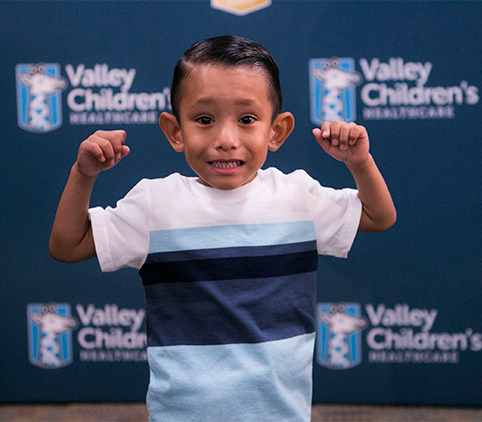Weighing less than an unopened soda can and one of the tiniest babies born in the world, Tyson Perez was fortunate just to survive. Going home from Valley Children’s Hospital six months later with no major complications was extraordinary.
Today, Tyson is 4 years old, enjoys watching professional wrestling and already knows his way around an iPad.
“Just look at him – he’s a gorgeous, friendly, sweet kid, full of life,” Valley Children’s Chief of Newborn Medicine Dr. Jeffrey Pietz said proudly as Tyson and his parents posed for news photographers.
“We’re so proud to be part of this special event,” Katie Phaphon, Tyson’s mom, said shortly after Valley Children’s Healthcare leaders made the public announcement at the Hospital on June 21. “Words cannot express our gratitude. The Valley Children’s team is what helped us make it through a very frightening time.”
Highest level NICU
Valley Children’s neonatal intensive care unit is the region’s only NICU certified by the state of California as a Regional Neonatal Intensive Care Unit – the highest level NICU possible. We are also the region’s only Level IV NICU, meaning it meets the highest standards set by the Academy of Pediatrics and is staffed and equipped to provide expert care for the tiniest and most critically ill babies. Our NICUs see some of the sickest babies in California yet our outcomes are some of the best in the country.
Born at 24 weeks’ gestation weighing only 12.7 ounces (360 grams), Tyson is living proof that even those as vulnerable as he was have a winning chance.
“Tyson is a highly unusual occurrence,” Dr. Pietz said. “He’s an amazing story.”
The little boy’s difficult journey began in the womb. An ultrasound at 19 weeks showed Tyson developing incorrectly. His mom’s diagnosis of preeclampsia, a potentially life-threatening disorder, compounded the situation.
Medical experts warned Katie and Matt Perez, then both in their early 20s, of Fresno that even if their son survived an expected premature birth, he would most likely suffer severe developmental delays and impairments. The pregnancy could also put Katie’s health at risk.
“Some suggested we terminate the baby,” Katie said sadly. “We didn’t want to make that choice.”
Maternal Fetal Center expertise
Referred to the Maternal Fetal Center at Valley Children’s, Katie had access to maternal-fetal medicine specialists – physicians specially trained in high-risk pregnancies who collaborate with the mother’s obstetrician. Valley Children’s partners with Saint Agnes Medical Center in Fresno to provide a unique array of maternal-fetal and pediatric services to help ensure the mom’s and baby’s healthy delivery and life.
Maternal-fetal medicine specialist Dr. Beni Adeniji obliged the parents’ request to take the pregnancy as far as possible unless Katie’s health became jeopardized. Katie remained hospitalized at Saint Agnes while Dr. Adeniji focused on extending her pregnancy through medications and intense monitoring. He administered steroids to accelerate the baby’s lung development, but still, “It became a race against time,” he said.
But when Katie’s blood pressure soared and her platelets dropped rapidly, the baby was delivered by cesarean section and immediately transferred to Valley Children’s Level IV NICU. “He was a beautiful sight,” Matt said of his son’s birth on Aug. 30, 2011.
Specialized NICU treatment
Now a new race began. At the time, of the 7,500 American babies born annually weighing less than a pound, only about 10% survived, even with advanced medical care. A baby with Tyson’s characteristics stood only a 7% chance of survival without severe impairment, according to national preterm birth outcome data.
Studies also indicated if babies born under 2 pounds, 3 ounces (1,000 grams) graduate from the NICU without chronic lung disease, severe intraventricular hemorrhage, or severe retinopathy of prematurity, they have an 88% chance of a normal outcome at 18 months. Advanced therapies reduce complications for babies admitted to our NICU within three days of birth.
“It’s vital these preemies receive specialized care within that time frame,” Dr. Pietz said. “Otherwise, it’s usually too late.”
Tyson beat the odds. Although he had some respiratory problems and retinopathy of prematurity, he continued to improve. “The fact that Tyson survived and without any major comorbidities is remarkable,” Dr. Pietz said.
A rare group
Weighing 9 pounds by March 2012, Tyson was ready to leave Valley Children’s. He became part of a rare group when he went home. An online database of the world’s smallest surviving babies born less than a pound listed fewer than 140 babies since 1936. The voluntary submissions didn’t represent all survivors.
At home Tyson utilized oxygen to boost his breathing and fed well. While he is a little behind in the height and weight category for his age, his parents say he does not have any significant health issues.
“We do everything we can now to make sure he has a happy childhood,” Matt said. “Whether that’s going to Disneyland, the lake, the park – we’re so grateful we have a life and can do these things together.”
Pediatric specialists continue to monitor Tyson’s progress, including pediatricians who provide complex primary care at Valley Children’s Charlie Mitchell Children’s Center.
Acknowledging the excellent medical treatment she and Tyson received before and after his birth, and their faith, Katie said, “Dr. Adeniji, Dr. Pietz, the nurses…Everyone on our team at Valley Children’s played a part that fit into the puzzle of saving our son.”
Katie and Matt are proud of Tyson Matthew Perez and say his name fits him – but not in the way people might think. “He’s not named after the fighter Mike Tyson,” Matt explained, himself a mixed martial arts (MMA) fighter. “Tyson means ‘high-spirited’ and Matthew, ‘gift of God.’ We think that’s perfect.”